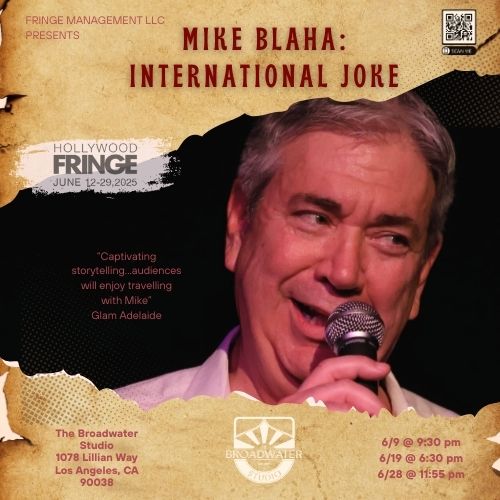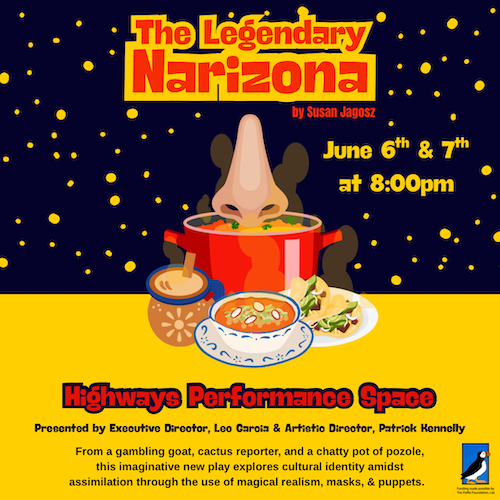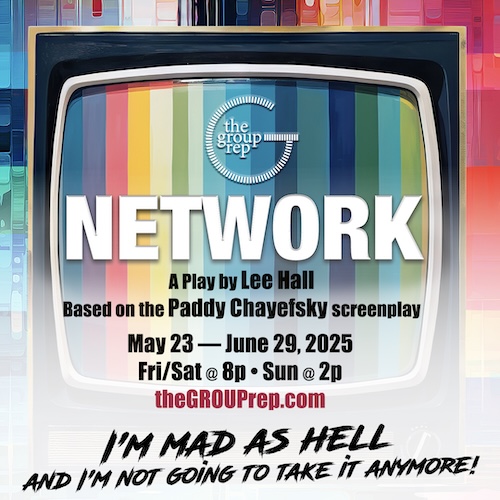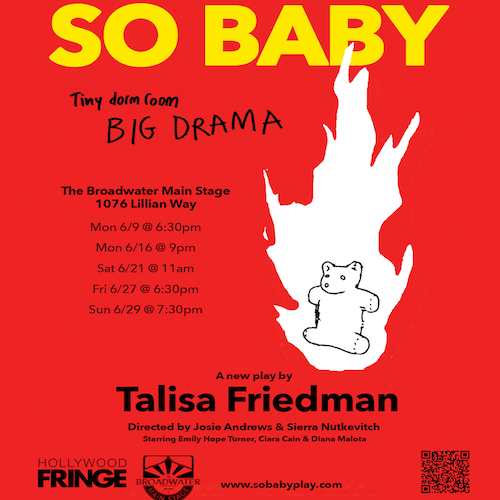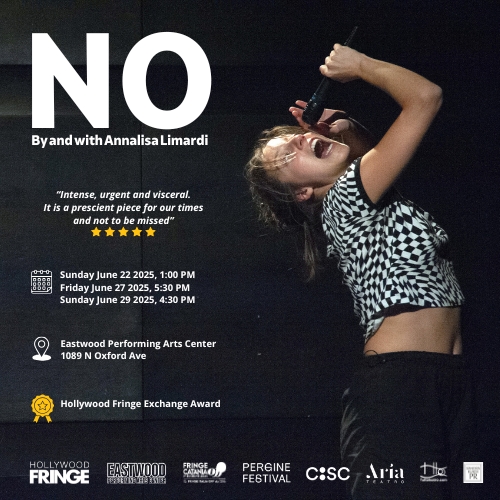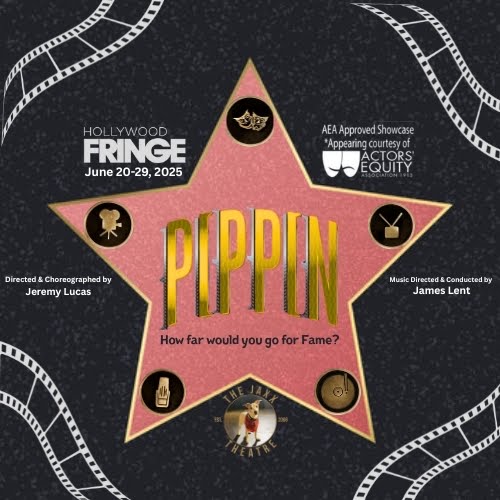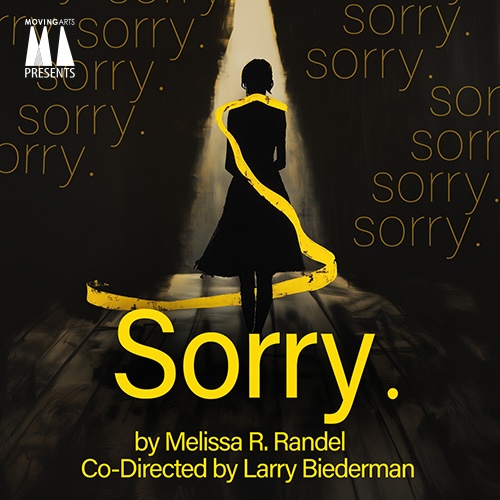
Kevin Flynn (Photo by Catherine Donovan)
Reviewed by Steven Leigh Morris
Odyssey Theatre Ensemble & Kevin Flynn
Through Oct. 29
RECOMMENDED
Kevin Flynn’s autobiographical solo performance, directed by Tim Bryon Owen, opens with the digital image on a screen above him — the photo “Lunch Atop a Skyscraper” (sometimes called “Men at Lunch”), snapped by a photographer whose identity remains in doubt.
Eleven men sit nonchalantly on an iron beam suspended, without guardrails, 69 floors above Manhattan, circa 1932, smoking and chatting. Some clutch box lunches. To employ that overused adjective, it’s “iconic” — and beloved — for its capacity to capture the cavalier disregard of danger in the service of building an American city, and the empire that extended from it.
(The photograph, taken from the adjoining RCA building, was staged as an ad for the skyscraper under construction at the time.)
Dressed in jeans, sneakers and a, well, blue-collar shirt, and on an almost bare stage, the amiable writer-performer draws attention to one fellow in the photograph’s far-most right. That man, Flynn explains, is his grandfather. The screen closes in on the young man — specifically, on his hand, which is clutching a bottle. (The Irish, what are you going to do?) A closer inspection reveals that the hand has only four fingers. (Iron workers were losing digits all the time. The Occupational Safety and Health Administration [OSHA] didn’t start operating until 1971.)
This is a photographic portrait of immigrants (Flynn’s grandfather emigrated from Ireland) who literally built a nation from a work ethic that, even now, seems confined to immigrants. The people who continue to build and re-build America’s cities and roads and bridges continue to be immigrants, from different continents, with much the same family ethos that Flynn describes as part of his upbringing, while the compass of their children and grandchildren, like Flynn himself, more often than not dissipates into a kind of self-absorption that Flynn portrays so candidly and introspectively.
Flynn has nothing bad to say about his grandfather or his parents. Much of his performance is a love letter to his father, Billy Flynn. Yes, it’s a bit tropey — call it Adoration of the Daddy.
He recounts an experience at 10-years-old, driving with his father, held up by the overweight driver of a garbage truck in front of them. The driver would stop, amble out of the truck, scoop up bags of garbage and toss them into the truck before waddling back to the driver’s seat. Kevin Flynn says that, as a child, he was amused by the sight of the large man whose buttocks were partly exposed when he bent over. He laughed and remarked, “What a loser.”
His father said nothing. Just stopped the car and got out to speak with the driver. Finally he called over young Kevin and ordered him to help the garbage collector by riding on the back of the truck, jumping off to pick up garbage bags and depositing them into the truck, so the driver didn’t have to leave his driver’s seat perch.
This, Kevin did, for several hours, in constant contact with the fetid smells emanating from the bags and from the truck itself. He finished his task coated in sweat, stinking of garbage, and exhausted.
“Pal,” his father counseled. “Never make fun of anybody who’s working for a living. He’s trying to feed his family the best he can.”
Talk about a moral compass.
Later in the show, he describes his father enlisting in the Korean War because a friend had been killed there. At 17, he was too young, so he forged an identity in order to serve. He almost died of pneumonia during that “bloodbath.” Upon his return to the US, his father (the man in the photo) welcomed him home by shaking his hand, telling him he did well, and asking him when he was going to get a job as an iron worker. It would be the next day. Not much time to ruminate on physical or emotional wounds or resentments, or concerns about identity.
Kevin Flynn tells us he couldn’t follow the family tradition of becoming an iron worker because he was afraid of heights — a potentially humiliating trait that he dared not confess to his family.
Instead, he left home to become a standup comedian in Boston, and made some headway in local clubs before coming to LA to be an actor. And this is where the show slides somewhat into the generic slog of the my-life-as-a-struggling-actor subgenre.
Celeb names get dropped in a manner that bespeaks an unflattering intoxication with the rich and famous, contrasted against the stoic rigor of his ancestors. Perhaps it’s just me, but I was not half as impressed as Flynn that Brad Pitt offered him a joint at a Hollywood party. That photograph held far too much sway (though maybe his grandfather or father would have said, “Good for you!” I just don’t know.).
Flynn describes — at a Reno airport, en route to a flight returning to LA — telling 70-something Mickey Rooney how honored he was to have his name on the same Lake Tahoe hotel billboard as Rooney himself. According to Flynn, Rooney stared at him before replying: “Kevin, go fuck yourself.” Flynn dismisses that, shocked but jocularly, as a swipe from a bitter old man. Perhaps Flynn needs to dig a bit deeper.
Flynn had broken up with his girlfriend after refusing to marry her when they both learned of his father’s terminal cancer diagnosis. When she flew out to comfort him, they were robbed at gunpoint outside the hotel where he was staying. After surviving this violent assault, he proposed marriage. After all, what is life for? On their honeymoon, while in Rome, his agent called with an audition for a lucrative job. He needed to fly back to LA ASAP. His new wife exploded with rage, and he turned down the job, and many others, setting up the divide between career and family. He kept choosing family, at the cost of his career, but that didn’t save his marriage. Complicated times.
Goodness, what a difference — to have the liberty to turn down work, which is really play, compared to his father and grandfather, who were expected to show up and work, with scant safety precautions, day after day, decade after decade, until they died. To have that autonomy. And still . . .
I’m not sure whether or not this a weakness in the show, but I never got a clear sense of Flynn’s purpose in becoming an actor. To be rich and famous, he told his family, but that’s not a purpose. That’s not a dedication or a calling. That’s just, obviously, a chase in a game where the rules keep changing and the rulers are as capricious as they are cruel. Satires of trying to make it in Hollywood are abundant, and this work feels couched in stronger stuff than that.
I remain vague as to what Flynn actually believed in, other than his own career climb. (Perhaps his departure from his family, for such a facile reason, is the point?) Because of this vagary, I couldn’t discern if this a work about an American culture that’s evolving and devolving at the same time, or just a trip down memory lane. At present, it straddles a line between the two, settling on Flynn’s devotion to his own daughter. Perhaps she, with luck, will have clearer guardrails in life than her dad, who, like his grandfather, without guardrails, sat on that beam in the open air, at the mercy of the wind and the sky, all for a promo ad.
Odyssey Theatre, 2055 S. Sepulveda Blvd., West LA. Thurs.-Sat., 8 pm, Sun., 4 pm; thru Oct. 29. www.OdysseyTheatre.com Running time: 90 minutes without intermission.



